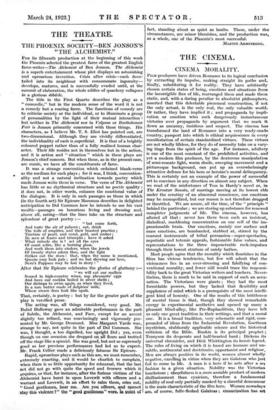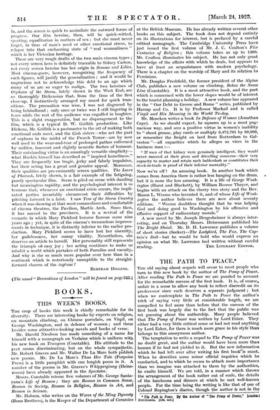THE CINEMA.
CINEMA MORALITY.
FILM producers have driven Romance to its logical conclusion by extracting its impulse, making straight its paths and, finally, substituting it for reality. They have arbitrarily chosen certain states of being, emotions and situations from the incorrigible flux of life, rearranged them and made them static, and, with a daring peculiar to absolutist philosophers, asserted that this delectable piecemeal construction, if not the only actual, is the only real, the only valuable world. Or rather, they have implied it ; and propaganda by impli- cation or emotion wins such dangerously instantaneous victories over propaganda by argument that we mark it down as uncanny, insidious and suspect. The cinema has transformed the land of Romance into a very ready-made country, passport into which is ethical acquiescence in every manifestation of certain standardized virtues. These virtues are not wholly lifeless, for they do of necessity take on a vary- ing tinge from the spirit of the age. For instance, adultery is one of the most constant of the prohibited activities, and yet a modern film producer, by the dexterous manipulation of semi-roseate light, warm shade, sweeping movement and a picturesque background, can put up an overwhelmingly attractive defence for his hero or heroine's moral delinquency. This is certainly not an example of the power of successful art to convince in any direction on almost any subject. When we read of the misfortunes of Tess in Hardy's novel or, in The Kreutzer Sonata, of marriage moving at its lowest ebb under the scrutiny of an abnormal conscience, our emotions may be monopolized, but our reason is not therefore drugged or throttled. We are aware, all the time, of the " principle " behind the particular ; we are storing up substance for renewed completer judgments of life. The cinema, however, has altered all that ; never has there been such an insistent, diabolical, maddening concentration on one cell of the im- pressionable brain. Our emotions, mainly our surface and mass emotions, are bombarded, stabbed at, stirred by the coarsest instruments of tribal persuasion—super-spectacles, nepotistic and totemic appeals, fashionable false values, and representations to the three impenetrable rock-impulses through. their lowest stratum of sandy bathos.
Most people agree that the morality which flourishes in the films has vicious tendencies, but few will admit that the viciousness lies in an over-stressing and falsifying of con- ventional morality, and fewer still would trace the responsi-
bility back to the great and_ writers and teachers. Never- theless, there is much to be said in support of such an accu- sation. The Victorians were giants ; they had the most formidable powers, but they lacked that flexibility and suppleness of mind which is a prerequisite of the most intelli- gent kind of honesty. One of the results of this brittleness of mental tissue is that, though they showed remarkable energy in experimental aesthetics and opened up many a pleasant blind-alley, like Pre-Raphaelitism, they have left
us only one great tradition in their writings, and that a moral one. It is a broad tradition, very schematic and rigid, com- pounded of ideas from the Industrial Revolution, Goethean mysticism, stubbornly applicable science and the historical criticism of the Bible. Ruskin is its principal prophet ; Tennyson its desperate and half-hearted bard ; Dickens its universal chronicler, and Dick Whittington its heroic legend. The rules of living on which it is based are humane and un- subtle, sentimental and doctrinaire, opportunist and religiose.
Men are always positive in its world, women almost wholly negative, excelling in virtue when they are Galateas who just
fail to come to life. A man is a hero if he acts after a Bet
fashion in a given situation. Nobility was the Victorian touchstone ; cheerfulness is a more amiable product of modern
disillusionment than cynicism, therefore a fundamental nobility of soul only partially masked by a cheerful demeanour is the main characteristic of the film hero. Women nowadays are. of course, fully-fleshed Galateas ; emancipation has set in, and the screen is quick to assimilate the outward forms of progress. Our film heroine, then, will be quick-witted,
sporting, equalitarian in matters of sex ; but she must never forget, in time of man's need or other emotional stress, to relapse into that enchanting state of " real womanliness " which is her Victorian heritage.
These are very rough drafts of the two main cinema types ; not every screen hero is definitely traceable to Sidney Carton, not every screen heroine has her origin in Sesame and Lilies. Most cinema-goers, however, recognizing the frequency of such figures, will justify the generalization ; and it would be ungracious not to acknowledge this debt to an age which many of us are so eager to malign.. The two heroines of Orphans of the Storm, lately shown in the West End, are so thoroughly Dickensian that, from the time of the first close-up, I instinctively arranged my mood for quick tran- sitions. The precaution was wise, I was not disgraced by being behindhand ; only once or twice was I still lingering in tears while the rest of the audience was engulfed in laughter. This is a slight exaggeratibn, but no disparagement to the film, which is a typical D. W. Griffith production. Like Dickens, Mr. Griffith is a pastmaster in the art of making both emotional ends meet, and the Gish sisters—who act the part of orphans in the midst of the French Terror—are by now well used to the wear-and-tear of prolonged pathos enlivened by sudden, innocent and slightly neurotic flashes of humour. Their outstanding virtue is an amazingly versatile simplicity— what Ruskin himself has described as " inspired homeliness." They are frequently too tragic, jerky and falsely impulsive, but their acting has a great and genuine appeal. Moreover, their qualities are pre-eminently screen qualities. The Loves of Pharaoh, lately shown, is a fair example of the fatiguing, purely spectacular film. Scene is piled on scene with dazzling but meaningless rapidity, and the psychological interest is so tenuous that, whenever an emotional crisis occurs, the impli- cated parties invariably circumvent their difficulties by pitching forward in a faint. I saw Tess of the Storm Country when it was showing at that most commodious and comfortable of cinema theatres, the Pavilion, Marble Arch. Since then, it has moved to the provinces. It is a revival of the scenario in which Mary Pickford became famous some nine years ago ; yet, in spite of the cinema's tremendous improve- ments in technique, it is distinctly inferior to the earlier pro- duction. Mary Pickford seems to have lost her sincerity, her guilelessness, her sunny vitality. Nevertheless, she deserves an article to herself. Her personality still represents the triumph of. easy joy ; her acting continues to make us inhabit a world which partakes of both Paradise and vacuity. And why is she so much more popular over here than in a continent which is notoriously susceptible to the straight- forward charms of the ingenue ?
BERTRAM HIGGINS.



































































 Previous page
Previous page